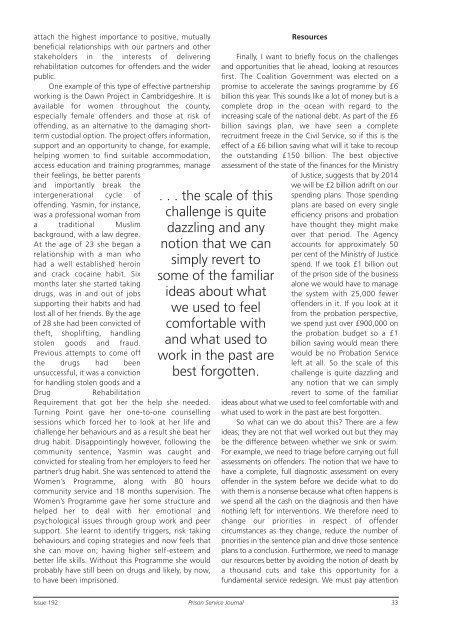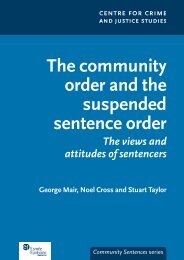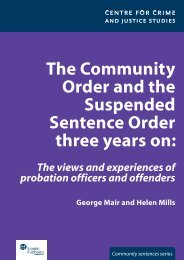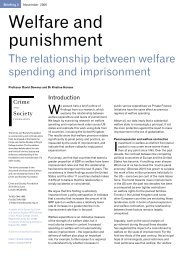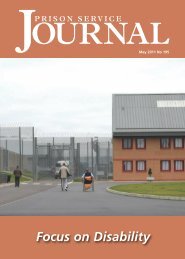PRISON SERVICE
PRISON SERVICE
PRISON SERVICE
- No tags were found...
You also want an ePaper? Increase the reach of your titles
YUMPU automatically turns print PDFs into web optimized ePapers that Google loves.
attach the highest importance to positive, mutuallybeneficial relationships with our partners and otherstakeholders in the interests of deliveringrehabilitation outcomes for offenders and the widerpublic.One example of this type of effective partnershipworking is the Dawn Project in Cambridgeshire. It isavailable for women throughout the county,especially female offenders and those at risk ofoffending, as an alternative to the damaging shorttermcustodial option. The project offers information,support and an opportunity to change, for example,helping women to find suitable accommodation,access education and training programmes, managetheir feelings, be better parentsand importantly break theintergenerational cycle ofoffending. Yasmin, for instance,was a professional woman froma traditional Muslimbackground, with a law degree.At the age of 23 she began arelationship with a man whohad a well established heroinand crack cocaine habit. Sixmonths later she started takingdrugs, was in and out of jobssupporting their habits and hadlost all of her friends. By the ageof 28 she had been convicted oftheft, shoplifting, handlingstolen goods and fraud.Previous attempts to come offthe drugs had beenunsuccessful, it was a convictionfor handling stolen goods and aDrugRehabilitationRequirement that got her the help she needed.Turning Point gave her one-to-one counsellingsessions which forced her to look at her life andchallenge her behaviours and as a result she beat herdrug habit. Disappointingly however, following thecommunity sentence, Yasmin was caught andconvicted for stealing from her employers to feed herpartner’s drug habit. She was sentenced to attend theWomen’s Programme, along with 80 hourscommunity service and 18 months supervision. TheWomen’s Programme gave her some structure andhelped her to deal with her emotional andpsychological issues through group work and peersupport. She learnt to identify triggers, risk takingbehaviours and coping strategies and now feels thatshe can move on; having higher self-esteem andbetter life skills. Without this Programme she wouldprobably have still been on drugs and likely, by now,to have been imprisoned.. . . the scale of thischallenge is quitedazzling and anynotion that we cansimply revert tosome of the familiarideas about whatwe used to feelcomfortable withand what used towork in the past arebest forgotten.ResourcesFinally, I want to briefly focus on the challengesand opportunities that lie ahead, looking at resourcesfirst. The Coalition Government was elected on apromise to accelerate the savings programme by £6billion this year. This sounds like a lot of money but is acomplete drop in the ocean with regard to theincreasing scale of the national debt. As part of the £6billion savings plan, we have seen a completerecruitment freeze in the Civil Service, so if this is theeffect of a £6 billion saving what will it take to recoupthe outstanding £150 billion. The best objectiveassessment of the state of the finances for the Ministryof Justice, suggests that by 2014we will be £2 billion adrift on ourspending plans. Those spendingplans are based on every singleefficiency prisons and probationhave thought they might makeover that period. The Agencyaccounts for approximately 50per cent of the Ministry of Justicespend. If we took £1 billion outof the prison side of the businessalone we would have to managethe system with 25,000 feweroffenders in it. If you look at itfrom the probation perspective,we spend just over £900,000 onthe probation budget so a £1billion saving would mean therewould be no Probation Serviceleft at all. So the scale of thischallenge is quite dazzling andany notion that we can simplyrevert to some of the familiarideas about what we used to feel comfortable with andwhat used to work in the past are best forgotten.So what can we do about this? There are a fewideas; they are not that well worked out but they maybe the difference between whether we sink or swim.For example, we need to triage before carrying out fullassessments on offenders. The notion that we have tohave a complete, full diagnostic assessment on everyoffender in the system before we decide what to dowith them is a nonsense because what often happens iswe spend all the cash on the diagnosis and then havenothing left for interventions. We therefore need tochange our priorities in respect of offendercircumstances as they change, reduce the number ofpriorities in the sentence plan and drive those sentenceplans to a conclusion. Furthermore, we need to manageour resources better by avoiding the notion of death bya thousand cuts and take this opportunity for afundamental service redesign. We must pay attentionIssue 192 Prison Service Journal33


